Today, Georgia Unites is proud to launch Transgender Voices of Georgia—a storytelling web hub dedicated to raising public awareness of who transgender people are, the unique hardships they face, and to make the case for their fair and equal treatment under the law.
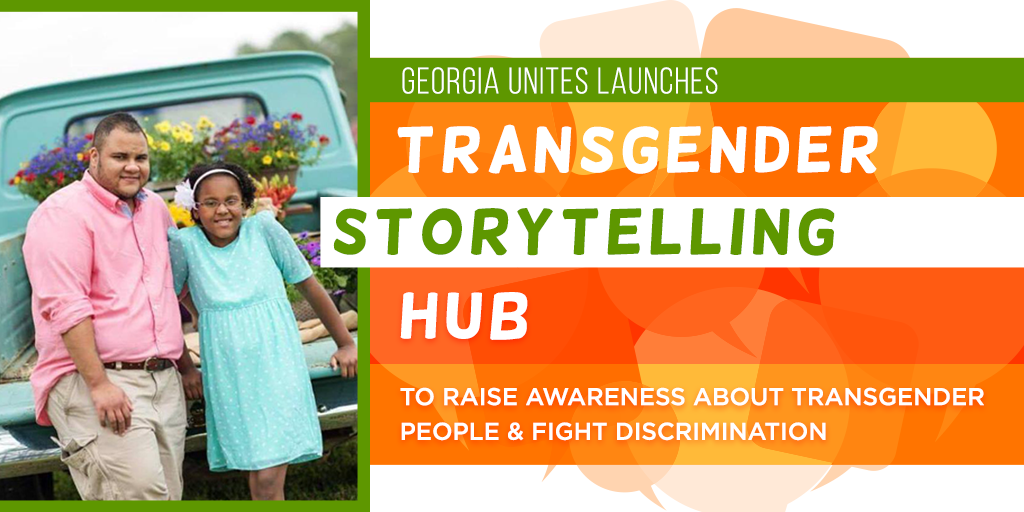
Transgender people are more visible than ever before. The Williams Institute estimates that there are approximately 1.4 million transgender people living in the United States—that’s almost double estimates from 2011.
Georgia has the fourth largest population of transgender people, by state, with more than 55,000 people reportedly living in the Peach State.
But with increased visibility has come increased rates of discrimination, harassment, and violence.
Findings from a 2011 study by NCTE and the Task Force show that 63% of transgender participants had experienced a “serious act of discrimination”—events like a lost job, eviction, homelessness, and assault that drastically impede one’s ability to sustain themselves financially or emotionally.
A vast 78% of transgender students reported harassment at school. Nine out of ten (90%) respondents had experienced harassment, mistreatment or discrimination on the job. And one in five (19%) reported having been denied housing because of their gender identity.
Transgender people are approximately twenty-five times more likely to attempt suicide than the general population.
This year, an estimated 34,000 transgender people will be barred from voting due to restrictive voter ID laws. Nearly half (40%) of the voting eligible transgender population in Georgia will face restrictions to voting.
The newly launched transgender storytelling hub seeks to spotlight these inequalities, to put a human face to discrimination, and build understanding and acceptance for transgender people.
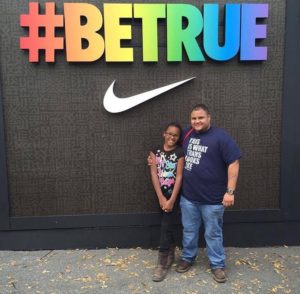 Ultimately, transgender people are a lot like their non-transgender peers. They have families. We spoke to Gabe Pelz, a transgender father, who transitioned when his daughter was around five years old. He said honesty, open communication, and lots of love made the transition easy. And ultimately, his daughter was one of the people in his life who most readily accepted his gender identity. “Kids accept things a lot better than adults do,” Gabe said.
Ultimately, transgender people are a lot like their non-transgender peers. They have families. We spoke to Gabe Pelz, a transgender father, who transitioned when his daughter was around five years old. He said honesty, open communication, and lots of love made the transition easy. And ultimately, his daughter was one of the people in his life who most readily accepted his gender identity. “Kids accept things a lot better than adults do,” Gabe said.
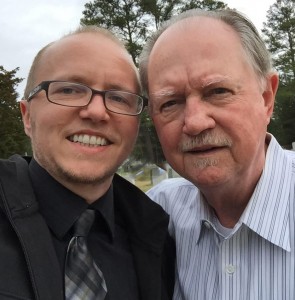 We spoke to James Sheffield, a long-time health advocate for LGBT people, and specifically for transgender people. He shared his experience of coming out to his father, a small-town man from southern Georgia. Even though his father had a hard time understanding what it means to be transgender, he supported James’ decision and loved him anyway.
We spoke to James Sheffield, a long-time health advocate for LGBT people, and specifically for transgender people. He shared his experience of coming out to his father, a small-town man from southern Georgia. Even though his father had a hard time understanding what it means to be transgender, he supported James’ decision and loved him anyway.
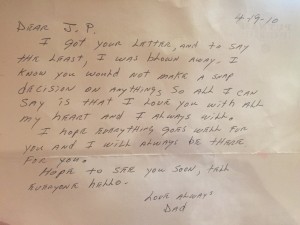
 Quinn Hudson, an employee of DeKalb County Schools, talked to us about his strong Methodist faith and how it gave him the tools to bring unconditional love to his family—and specifically, to his relationship with his transgender son Wallace.
Quinn Hudson, an employee of DeKalb County Schools, talked to us about his strong Methodist faith and how it gave him the tools to bring unconditional love to his family—and specifically, to his relationship with his transgender son Wallace.
“I brought to my relationship a love for my children as paramount,” Quinn said. “To me nothing would undermine my unconditional love for my children, and I learned about unconditional love through my faith journey and through my studying scripture and being active in the Methodist Church.”
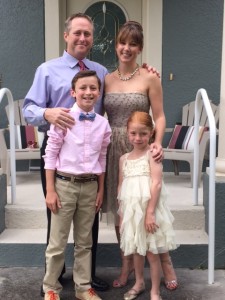 And Jen Slipakoff talked about the need for transgender-inclusion at school to ensure all—including her transgender daughter Allie—students can participate fully and equally regardless of their gender identity.
And Jen Slipakoff talked about the need for transgender-inclusion at school to ensure all—including her transgender daughter Allie—students can participate fully and equally regardless of their gender identity.
Transgender people are public servants. Dana Fuchko is a transgender veteran who is now speaking out in support of a recent Pentagon decision to lift the ban on transgender service members. After having proudly served her country, she hopes to one day be fully protected in her home state of Georgia.
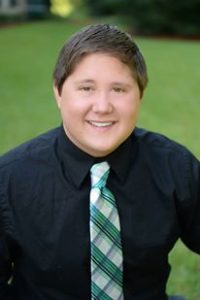 Jake Moore can speak first-hand to the need for protections, after having been discriminated against and denied service at a spa just outside of Atlanta. He and his girlfriend are sharing their story to help make the case for fair and equal treatment under the law.
Jake Moore can speak first-hand to the need for protections, after having been discriminated against and denied service at a spa just outside of Atlanta. He and his girlfriend are sharing their story to help make the case for fair and equal treatment under the law.
At the end of the day, transgender people want the same things as everyone else—to work hard, create a home for their families, and to go about their day-to-day lives without fear of harassment or discrimination.
MORE RESOURCES
If you are an LGBT person who has experience discrimination or harassment because of your sexual orientation or gender identity—or simply someone who supports fair and equal treatment for LGBT Georgians under the law—and would like to share your story, click here.
If you are transgender, and you are concerned about your eligibility to vote, click here to get redirected to Georgia Equality’s Transgender Voter ID Toolkit and learn about your options.
If you are a transgender student or a parent who believes your child has been discriminated against at schools, visit Lambda Legal’s Transgender Students Rights Watch to log a complaint and get connected with legal experts and resources.
SHARE THIS STORY



 @GeorgiaUnites
@GeorgiaUnites